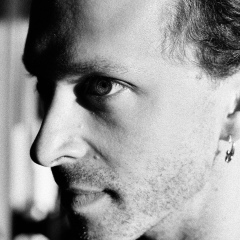Отличная злободневная статья про то, что биотех хакают уже четыре десятилетия, но пока что это биология хакает всех) Причем ее автор сам продал несколько стартапов большой фарме. Начинает он весело - еще в 1981 году вышла статья “Designing Drugs With Computers” в журнале Discover:
"Drug companies know they simply cannot be without these computer techniques. They make drug design more rational. How? By helping scientists learn what is necessary, on the molecular level, to cure the body, then enabling them to tailor-make a drug to do the job… This whole approach is helping us avoid the blind alleys before we even step into the lab… Pharmaceutical firms are familiar with those alleys. Out of every 8,000 compounds the companies screen for medicinal use, only one reaches the market. The computer should help lower those odds… This means that chemists will not be tied up for weeks, sometimes months, painstakingly assembling test drugs that a computer could show to have little chance of working. The potential saving to the pharmaceutical industry: millions of dollars and thousands of man-hours."
What’s great about this quote is that you can hear its echo in current Silicon Valley tech-solves-biotech pitches, but it was from a Discover magazine article in August 1981 called “Designing Drugs With Computers”.
И продолжает отлично:
"There remains a wonderful abundance of artful empiricism in the discovery of new drugs, especially around human biology, and this should be embraced."
"Furthermore, adding another dose of realist-skepticism, as these software tools have come online in the industry over the past couple decades, R&D productivity has largely gone downward, not upward. Correlation is not causation, but many in silico techniques haven’t panned out in making better drugs. More QSAR doesn’t always help if the data inputs aren’t ideal, they just make the piles bigger (and reduce the signal-to-noise ratio). More crystallography and computational work around inappropriate structures, unnatural conformers or inaccurate protein homologues doesn’t help drive a discovery campaign in the right direction."
"The answer is that instead of “software eats biotech,” the reality of drug discovery today is that biology consumes everything. <...> Biology also drives the costs and timelines in drug R&D, as well as many of the headaches–as it still takes a lot of sweat, time and money to figure all that biology out. "
"It’s worth highlighting a few examples about biology defeating or obstructing CADD-inspired discovery, though the list of programs could be very very long. T-cell kinase ZAP70 has been attacked by CADD since the mid-1990s (here), and yet there are no approved drugs against it. MAPK/p38 is another well-trodden CADD target: dozens of publications out there about CADD success stories against p38 with new and improved binders and the like; yet clinical development is a veritable graveyard for these programs, as figuring out the safe and effective biology of these projects remains a challenge. Or take renin inhibition–after years of great CADD-enabled discovery, the first program got approved but only to find out in subsequent Phase III that drug development wasn’t kind (see #16 in the FDA’s recent roster of failures)."
"Don’t misinterpret this post, I’m a believer in CADD and the power of big data to drive positive contributions to drug discovery. But I’m also a realist, and an investor who needs to make a return on our investments within my lifetime–and in general returns correlate with discovering and developing high-impact new medicines."
https://www.forbes.com/sites/brucebooth/2017/04/26/four-decades-of-hacking-biotech-and-yet-biology-still-consumes-everything
"Drug companies know they simply cannot be without these computer techniques. They make drug design more rational. How? By helping scientists learn what is necessary, on the molecular level, to cure the body, then enabling them to tailor-make a drug to do the job… This whole approach is helping us avoid the blind alleys before we even step into the lab… Pharmaceutical firms are familiar with those alleys. Out of every 8,000 compounds the companies screen for medicinal use, only one reaches the market. The computer should help lower those odds… This means that chemists will not be tied up for weeks, sometimes months, painstakingly assembling test drugs that a computer could show to have little chance of working. The potential saving to the pharmaceutical industry: millions of dollars and thousands of man-hours."
What’s great about this quote is that you can hear its echo in current Silicon Valley tech-solves-biotech pitches, but it was from a Discover magazine article in August 1981 called “Designing Drugs With Computers”.
И продолжает отлично:
"There remains a wonderful abundance of artful empiricism in the discovery of new drugs, especially around human biology, and this should be embraced."
"Furthermore, adding another dose of realist-skepticism, as these software tools have come online in the industry over the past couple decades, R&D productivity has largely gone downward, not upward. Correlation is not causation, but many in silico techniques haven’t panned out in making better drugs. More QSAR doesn’t always help if the data inputs aren’t ideal, they just make the piles bigger (and reduce the signal-to-noise ratio). More crystallography and computational work around inappropriate structures, unnatural conformers or inaccurate protein homologues doesn’t help drive a discovery campaign in the right direction."
"The answer is that instead of “software eats biotech,” the reality of drug discovery today is that biology consumes everything. <...> Biology also drives the costs and timelines in drug R&D, as well as many of the headaches–as it still takes a lot of sweat, time and money to figure all that biology out. "
"It’s worth highlighting a few examples about biology defeating or obstructing CADD-inspired discovery, though the list of programs could be very very long. T-cell kinase ZAP70 has been attacked by CADD since the mid-1990s (here), and yet there are no approved drugs against it. MAPK/p38 is another well-trodden CADD target: dozens of publications out there about CADD success stories against p38 with new and improved binders and the like; yet clinical development is a veritable graveyard for these programs, as figuring out the safe and effective biology of these projects remains a challenge. Or take renin inhibition–after years of great CADD-enabled discovery, the first program got approved but only to find out in subsequent Phase III that drug development wasn’t kind (see #16 in the FDA’s recent roster of failures)."
"Don’t misinterpret this post, I’m a believer in CADD and the power of big data to drive positive contributions to drug discovery. But I’m also a realist, and an investor who needs to make a return on our investments within my lifetime–and in general returns correlate with discovering and developing high-impact new medicines."
https://www.forbes.com/sites/brucebooth/2017/04/26/four-decades-of-hacking-biotech-and-yet-biology-still-consumes-everything
Отличная злободневная статья про то, что биотех хакают уже четыре десятилетия, но пока что это биология хакает всех) Причем ее автор сам продал несколько стартапов большой фарме. Начинает он весело - еще в 1981 году вышла статья “Designing Drugs With Computers” в журнале Discover:
"Drug companies know they simply cannot be without these computer techniques. They make drug design more rational. How? By helping scientists learn what is necessary, on the molecular level, to cure the body, then enabling them to tailor-make a drug to do the job… This whole approach is helping us avoid the blind alleys before we even step into the lab… Pharmaceutical firms are familiar with those alleys. Out of every 8,000 compounds the companies screen for medicinal use, only one reaches the market. The computer should help lower those odds… This means that chemists will not be tied up for weeks, sometimes months, painstakingly assembling test drugs that a computer could show to have little chance of working. The potential saving to the pharmaceutical industry: millions of dollars and thousands of man-hours."
What’s great about this quote is that you can hear its echo in current Silicon Valley tech-solves-biotech pitches, but it was from a Discover magazine article in August 1981 called “Designing Drugs With Computers”.
И продолжает отлично:
"There remains a wonderful abundance of artful empiricism in the discovery of new drugs, especially around human biology, and this should be embraced."
"Furthermore, adding another dose of realist-skepticism, as these software tools have come online in the industry over the past couple decades, R&D productivity has largely gone downward, not upward. Correlation is not causation, but many in silico techniques haven’t panned out in making better drugs. More QSAR doesn’t always help if the data inputs aren’t ideal, they just make the piles bigger (and reduce the signal-to-noise ratio). More crystallography and computational work around inappropriate structures, unnatural conformers or inaccurate protein homologues doesn’t help drive a discovery campaign in the right direction."
"The answer is that instead of “software eats biotech,” the reality of drug discovery today is that biology consumes everything. <...> Biology also drives the costs and timelines in drug R&D, as well as many of the headaches–as it still takes a lot of sweat, time and money to figure all that biology out. "
"It’s worth highlighting a few examples about biology defeating or obstructing CADD-inspired discovery, though the list of programs could be very very long. T-cell kinase ZAP70 has been attacked by CADD since the mid-1990s (here), and yet there are no approved drugs against it. MAPK/p38 is another well-trodden CADD target: dozens of publications out there about CADD success stories against p38 with new and improved binders and the like; yet clinical development is a veritable graveyard for these programs, as figuring out the safe and effective biology of these projects remains a challenge. Or take renin inhibition–after years of great CADD-enabled discovery, the first program got approved but only to find out in subsequent Phase III that drug development wasn’t kind (see #16 in the FDA’s recent roster of failures)."
"Don’t misinterpret this post, I’m a believer in CADD and the power of big data to drive positive contributions to drug discovery. But I’m also a realist, and an investor who needs to make a return on our investments within my lifetime–and in general returns correlate with discovering and developing high-impact new medicines."
https://www.forbes.com/sites/brucebooth/2017/04/26/four-decades-of-hacking-biotech-and-yet-biology-still-consumes-everything
"Drug companies know they simply cannot be without these computer techniques. They make drug design more rational. How? By helping scientists learn what is necessary, on the molecular level, to cure the body, then enabling them to tailor-make a drug to do the job… This whole approach is helping us avoid the blind alleys before we even step into the lab… Pharmaceutical firms are familiar with those alleys. Out of every 8,000 compounds the companies screen for medicinal use, only one reaches the market. The computer should help lower those odds… This means that chemists will not be tied up for weeks, sometimes months, painstakingly assembling test drugs that a computer could show to have little chance of working. The potential saving to the pharmaceutical industry: millions of dollars and thousands of man-hours."
What’s great about this quote is that you can hear its echo in current Silicon Valley tech-solves-biotech pitches, but it was from a Discover magazine article in August 1981 called “Designing Drugs With Computers”.
И продолжает отлично:
"There remains a wonderful abundance of artful empiricism in the discovery of new drugs, especially around human biology, and this should be embraced."
"Furthermore, adding another dose of realist-skepticism, as these software tools have come online in the industry over the past couple decades, R&D productivity has largely gone downward, not upward. Correlation is not causation, but many in silico techniques haven’t panned out in making better drugs. More QSAR doesn’t always help if the data inputs aren’t ideal, they just make the piles bigger (and reduce the signal-to-noise ratio). More crystallography and computational work around inappropriate structures, unnatural conformers or inaccurate protein homologues doesn’t help drive a discovery campaign in the right direction."
"The answer is that instead of “software eats biotech,” the reality of drug discovery today is that biology consumes everything. <...> Biology also drives the costs and timelines in drug R&D, as well as many of the headaches–as it still takes a lot of sweat, time and money to figure all that biology out. "
"It’s worth highlighting a few examples about biology defeating or obstructing CADD-inspired discovery, though the list of programs could be very very long. T-cell kinase ZAP70 has been attacked by CADD since the mid-1990s (here), and yet there are no approved drugs against it. MAPK/p38 is another well-trodden CADD target: dozens of publications out there about CADD success stories against p38 with new and improved binders and the like; yet clinical development is a veritable graveyard for these programs, as figuring out the safe and effective biology of these projects remains a challenge. Or take renin inhibition–after years of great CADD-enabled discovery, the first program got approved but only to find out in subsequent Phase III that drug development wasn’t kind (see #16 in the FDA’s recent roster of failures)."
"Don’t misinterpret this post, I’m a believer in CADD and the power of big data to drive positive contributions to drug discovery. But I’m also a realist, and an investor who needs to make a return on our investments within my lifetime–and in general returns correlate with discovering and developing high-impact new medicines."
https://www.forbes.com/sites/brucebooth/2017/04/26/four-decades-of-hacking-biotech-and-yet-biology-still-consumes-everything
У записи 26 лайков,
3 репостов,
1380 просмотров.
3 репостов,
1380 просмотров.
Эту запись оставил(а) на своей стене Андрей Афанасьев













































